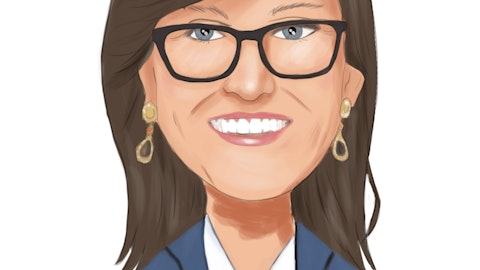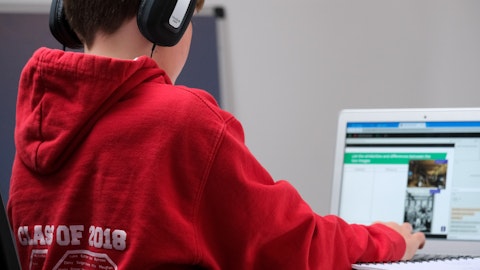Chip Paucek: A little bit, Dave. And I would be €“ I would love to tell you that we have had a lot. We are not exactly sure what investors thought of it. We didn’t do it for investor purposes. We did it because we really believe that lower cost is better for the student and candidly better for 2U because these are not inelastic goods. So, as the price goes up, demand goes down and we unilaterally pay for that. So, we do think putting sort of our money where our mouth is in reducing the rev share in order to drive the cost down, we thought is a really good goal. It is happening. We don’t have anything to announce yet, but we will have a couple. But these things take time. So, compared to flex, we made two announcements at the same time, sort of swapping rev share, we think it’s really important that the world understands that we are willing to do that and are excited to do it.
And therefore, debunks that narrative. But compared to flex, we got a lot of interest in flex and not as much interest in lowering tuition. So, we have more work to do there.
David Lustberg: Got it. That’s helpful. And maybe just one more if I may. I wanted to double click a little bit on the enterprise. Really good growth from you guys, obviously, of the small base, I think roughly 5% of your total revenue today. Excited to hear more, it sounds like you guys got a lot to tell us at the Investor Day. But just thinking about the long-term perspective of this business, is this something that you expect could grow to a third or a half of your revenue over time? How are you guys thinking about the long-term contribution of enterprise?
Paul Lalljie: We think this will get big. Sorry, that was it.
David Lustberg: Yes. That’s great. Yes. Appreciate it.
Operator: We will move to our next question from Brett Knoblauch with Cantor Fitzgerald. Your line is open.
Brett Knoblauch: Hi Chip and Paul. How are you guys doing? Just maybe two on my end. Just like, I guess in general, I think previous kind of recessions or maybe €“ and this is where the labor market really deteriorated. I would imagine a lot of the incremental unemployed went to degree route. Are you seeing any change in I guess or do you expect a difference in the market led theory this time around, where these people would go degrees or maybe your Alt Cred segment?
Chip Paucek: So Brett, I would say in the €“ if you look at the research, typically, job-oriented programs moved first. We have definitely seen that. So, our boot camps are doing very well. And important to remind everyone that we €“ with Gallup, we released a study that showed that there is a year one $11000-salary increase from the boot camps, also doing very well for people of color. So, like if the boot camps are a really good story, from an outcomes point of view. We do think that this will transfer to degree over time. Obviously, everyone is talking about the layoffs and it’s obviously, it’s not great for those companies. But the fact is, typically, the degree business, you would expect it to be countercyclical, but not necessarily to the economy as much as it is to the labor market.





